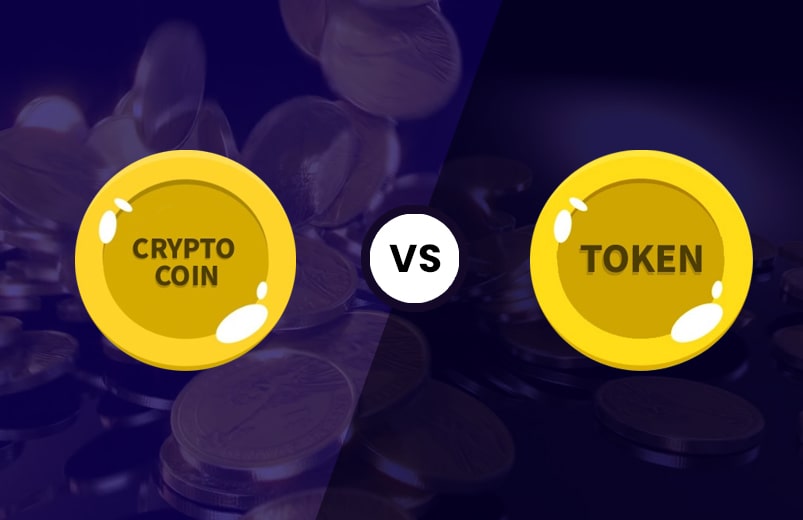Nowadays, bitcoin & other cryptocurrencies rule the financial world and everyone feels its worth a try to make the investment. Yes, it’s volatile, still, people are anxious about them. They love to experiment with new things and express their desire to find a result from such investments. However, if you are into the crypto-world then you might get confused with certain terminologies as they are closely related. ‘Coins’ and ‘Tokens’ are two such terminologies that fit such contest. Epixel Multi Level Marketing Software will help you in determining their proper definitions and their major differences.
Possibly, words like “coin” and “token” are often used as synonyms and considered by many people as interchangeable. But they refer to two completely different concepts. Sometimes people use the term “coin” to refer to what other people call “tokens”, and “token” to refer to what others call “coins”. Some people will use either term to refer to all the digital assets currently available.
Coins are usually termed as altcoins - coins that are alternative for Bitcoin & they all are tagged under one category - cryptocurrencies! Tokens are assets that act even as a payment method but within the concerned project by internal token passing and it holds a value! A token holder gets the right to participate in the concerned event but a coin holder might not get that advantage.
There are big differences between crypto coins and crypto tokens, so it’s important you know what they are! Let me help you in differentiating them with proper facts and valid points. Here is an expanded list of the differences between token and coin in detail.
| Coins or Altcoins | Tokens | |||
|---|---|---|---|---|
| Terminology | ||||
| Examples: Bitcoin (BTC), Litecoin (LTC), Ethereum (ETH), Ripple (XRP), Stellar (XLM), NEO (NEO), NEM (XEM), Monero (XMR) | Examples: EOS (Ethereum platform), TRON (Ethereum Platform), Tether (Omni platform) | |||
| Alternative cryptocurrencies or digital coins are also called as altcoins or simply “coins”. They’re often used interchangeably. Altcoins simply refers to coins that are an alternative to Bitcoin or Ethereum like digital currencies. | Tokens are a representation of a particular asset or utility, that usually resides on top of another blockchain. Tokens can represent basically any assets that are fungible and tradeable, from commodities to loyalty points to even other cryptocurrencies! | |||
| All altcoins reside and possess on their own independent blockchain platform | Tokens are created on an existing blockchain platform. It always depends on that particular ecosystem | |||
| Altcoins are separate currencies with their own separate blockchain | Tokens operate on top of a blockchain that facilitates the creation of decentralized applications | |||
| Creation and Deployment | ||||
| Usually, coins are created by cloning existing stable coin core and setting up their own blockchain ecosystem. Some examples of altcoins that are created using Bitcoin’s codes are Namecoin, Peercoin, Litecoin, etc. | Tokens are created by writing and deploying smart contracts in the existing blockchain. The most common blockchain token platform is Ethereum. Tokens that are built on the Ethereum platform are familiar like ERC-20 tokens. | |||
| Sometimes coins are also created by modifying existing code to meet its purpose. | Popular token creation platforms are Ethereum, Waves, Stellar, etc. | |||
| Creating a token and setting up its own blockchain echo system is not that easy and time-consuming process when compared to token creation | The majority of coins in existence (close to 80%) are tokens since they’re much easier to create. | |||
| Most of the new coins are created using the core of Bitcoin (BTC) or Litecoin (LTC) or Ethereum (ETH) or Ripple (XRP) | ERC-20 also make the creation of new tokens extremely easy, and that is why Ethereum has become the most popular platform for ICO’s | |||
| Usage | ||||
| Coins are an alternative to traditional currency, or you can say they are a digital variant of conventional currency. | Most tokens exist to be used with decentralized applications, or dApps. While tokens are also a medium of exchange, they offer functionality above and beyond that of coins. | |||
| Coins to pay for online services, products, and goods, or you can save it as an investment. Pretty much same application as traditional currency. | Tokens are usually created and distributed to the public through Initial Coin Offerings (ICOs), which are a form of crowdfunding or STO, etc. | |||
| Coins are usually used as a payment option | Tokens are not used for payment option but can be exchanged for an equivalent value and also sold through network marketing | |||
| New coins are generated using mining. Cryptocurrency mining describes a process where an individual, group of individuals, or a business, will use high-powered computers to solve complex mathematical equations in an effort to validate a block of transactions. | New coins are added using the mining method which is already written in smart contract | |||
| Fees & Costs | ||||
| Coins are hosted in its own blockchain ecosystem. So at least 4-5 nodes are required to validate the transactions. These nodes can be in a single server using dockers or need separate servers when the transactions grow. |
No hosting is required. The smart connect need to be deployed in existing blockchain platform like Etherum or waves. |
|||
| No additional fees per transactions since it is not depending on any platforms | It needs to pay a very small transaction fee to the platform where the token(smart contract) is deployed. | |||
| Listing in public exchange | ||||
| Very much regulated and a lot of processes to list in public exchanges | It is very easy to get listed on public exchanges | |||
| Wallet, Block Explorer, and API | ||||
| Need to create it own wallet | It can be used existing wallets like Metamask, MyEtherWallet, etc. | |||
| Need to create its own blockchain explorer | It will be automatically listed on the public blockchain explorer like etherscan.io | |||
| Need to create and manage its own API interfaces to interact with other 3rd party platforms | The stable API interface is already existing | |||
That’s it! These are the major differences between token and coin. Hope I have covered enough details to make the differences much easier to understand. Never get confused again with these terminologies and basically, digital coins are good assets to make a potential investment. Make sure you did good research and study on the digital coin you would like to invest in.
Digital coins do hold value and call it ‘market cap’. This rate changes as per the demand, more demand or circulation means more value, with more value the investment gains its upper hand! Like the Bitcoin surge, the investors can gain high returns and use it as a payment method. Just in case you are not aware, the payment platform must also support digital currency payment method! That’s about digital coins, now let’s talk about tokens in brief and conclude this article.
Let me explain tokens with a simple use case if you’re accepting tokens from a team say like you are a product distributor of a well known direct selling company and they are paying you in terms of tokens instead of fiat currency. Here, what you need to understand is that the tokens do have a value on a particular project but not outside of that system. Make sure they have an agreement with any of the popular exchanges like Binnance, Bitfinex, etc. so that you can later exchange it for real money or else you might have to prefer fiat currency for payment!
Discover how we build resilient businesses with advanced MLM functionalities
These token offering companies need to register on the exchanges even if you received many such tokens, in short, a token must hold real value and act like an assured asset for encashing in later stages using such exchange platforms.
FYI, you can buy tokens for coins but not vice versa. Coins, tokens, etc. are usually based on the cryptocurrencies and that’s the main reason for using them as synonyms.
Have a good time and see you soon with more articles that clear out the possibilities of dilemma's in the crypto MLM world!





Leave your comment
Fill up and remark your valuable comment.